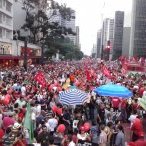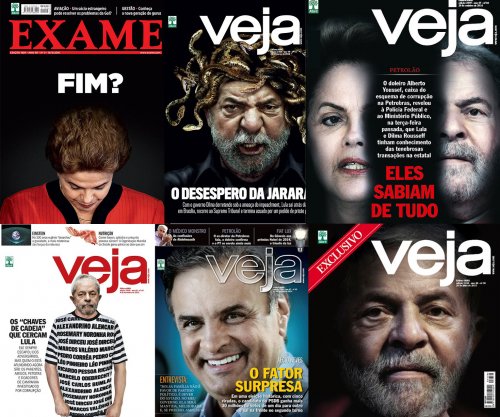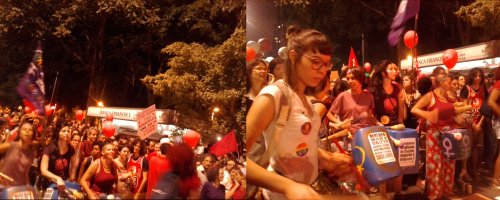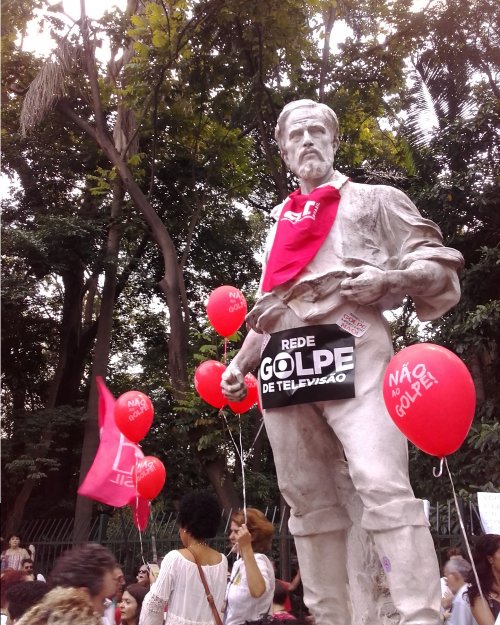English · Español

23 March 2016 | Special reports | Coup d´Etat in Brazil | Resisting neoliberalism | Human rights
Over 1,350,000 demonstrators take to the streets in Brazil in defense of democracy and for popular projects
Download: MP3 (4.7 Mb)
In the framework of the intensification of the attempts to destabilize democracy, Frente Brasil Popular, made up of peasant movements, groups in defense of the right to housing, feminists, unionists, sexual diversity activists, among others, called on to participate in mobilizations on March 18 in the main cities of the country. The epicenter of the most conservative forces of the country, Sao Paulo, was the city that gathered the most demonstrators. Over 500 thousand people took Avenida Paulista with the demands of popular movements present and the common demand "No to the Coup".
The threats of an impeachment against President Dilma Rousseff gained strength in the past weeks. This added to the persecution of former president Luiz Inácio Lula da Silva, accused by the opposition of being involved in cases of corruption with Petrobrás, under investigation by the Federal Police through the "Lava Jato" operation.
Manipulation and selective outrage
This operation is considered the largest corruption investigation in Brazil, involving large construction companies such as Odebrecht and Camargo Correa, as well as members of several political parties. Among them the PT, but also the PSDB (the largest party of the opposition) and the PMDB, party of the Vice-President of the country, which is deciding if they will continue with their alliance with the PT or not.
At this point, the role of the most influential communication media is undeniable. Before the demonstrations that took place on Friday, the opposition carried out some other demonstrations on March 13. The main TV channel of the country, Rede Globo, spent the entire day covering those demonstrations, taking clear sides for the end of Dilma´s administration. The most widely reached newspapers and magazines in Brazil behaved similarly to this.

Recently the journalistic website Congresso em foco published a list of MPs that are under investigation by the Federal Supreme Court, the highest entity of the Brazilian Judicial Branch. The list does not reflect what is portrayed by the massive media, where the party in office is considered practically as the sole culprit in corruption acts.
"This is the moment to take to the streets"
With different views about the PT´s administration, hundreds of thousand of people took to the streets on Friday in all Brazilian States under the common slogan "In the streets against the Coup and in defense of democracy". In an interview with Brasil de Fato, MST leader Joao Pedro Stédile made reference to the need to defend the Rule of Law, without stopping to be critical towards the government: "Dilma has made many mistakes. Harassed by communication media, even after the popular mobilizations against the Coup, the government took over part of the neoliberal agenda of the defeated candidate Aécio. (…) But defending democracy, being against the Coup, does not contradict the idea of criticizing the mistakes of the government and demanding a change in the economic policy and the adoption of measures to improve the living conditions of the people".

In light of the tension experienced these days in Brazil, the success of the call to demonstrate was considered extremely positive by the organizers: "We are seeing right now in Brazil an increase of the reactionary strength of our society. Therefore it is time for movements to join together, to build a strong unity in order to combat this fascist force that has advanced in our society, mainly pushed by the bourgeois communication media", said Joaquim Piñero of the MST, present at the mobilizations in Sao Paulo, to Real World Radio.
The World March of Women, also member of Frente Brasil Popular, was present with feminist chants and drums. In an interview with Real World Radio, Miriam Nobre spoke of the need to defend the advances in the country in the past few years, and fight against the steps backwards: "We came here to defend what we have already achieved, such as the reduction of the breach between men and women salaries, or the policies addressed to peasant women. We are resisting the threats, we are resisting the conservative offensive, which is mainly oriented against the people who fight. That´s why the popular movements have joined forces to say "NO" to any setback in our country".

The agenda of resistance will continue on March 31, day in which Brasil Popular and Povo Sem Medo are organizing a massive march towards Brasilia, capital of Brazil, in addition to different events in several cities. This time, the mobilizations will include more specific demands: "Against the Welfare Reform; against the privatization of Petrobrás; in defense of Pré Sal; No to the Anti-terrorism law; against the criminalization of social movements; no to tax adjustments and social investment cuts; in defense of jobs and the rights of workers; "Cunha Out!; against the impeachment", states the press release calling to the march.

Fotos: Real World Radio
Imagen: Real World Radio







